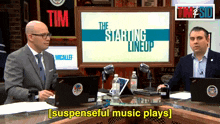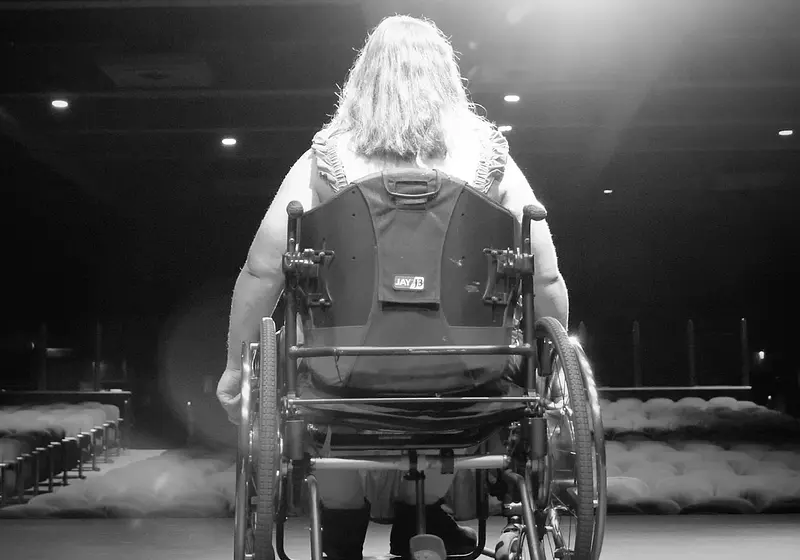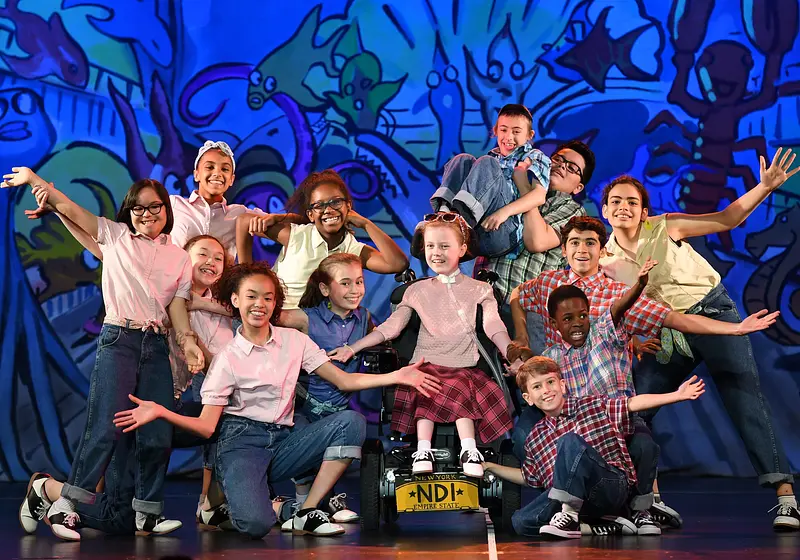For performers with disabilities, the path to a genuinely equal, inclusive, and representative entertainment industry still remains unclear.
While there has been some positive change in recent years, progress does remain frustratingly slow – something that Avery Roberts, Jess Westman, and Molly Nilsen can all vouch for.
Each have worked towards success in their respective fields of the industry and navigated obstacles along the way. Roberts is a dancer who became the first wheelchair user to perform on-stage at Radio City Music Hall, and one of the first to perform on a national live television production (for NBC's Annie Live!).
Westman is an actor, writer, composer, and creator of Wheels: An Original Musical – a show based on his own experience of living with muscular dystrophy. And Nilsen is a singer, Senior in a New York City BFA Musical Theater program, and a recent cast member for Through The Sunken Lands at the Kennedy Center in Washington DC.

Avery Roberts on stage at Radio City Music Hall
Photo by MSG Entertainment
Despite their different areas of work, they were recently united through one cause: Inclusivity Is Being Re-Defined, a new video which advocates for meaningful change in the entertainment industry for people from the disability community.
The video – directed, co-produced, and choreographed by Roberts; co-produced and composed by Westman; and with Nilsen singing the accompanying song – aims to break down common misconceptions, change perspectives, and ensure that people from the disability community feel “seen and heard”.
The initial inspiration for the video came after Roberts had an “eye-opening” and “horrifying” experience whilst working on a production with an award-winning choreographer, in which her and another dancer - the only wheelchair users in the ensemble - were repeatedly called “wheelchairs" as the choreographer “hadn't bothered" to learn their names.
During the same production, an academic tutor inquired to Agnes McConlogue Ferro - a Pediatric Physical Therapist whom Roberts met during her time at the National Dance Institute - if Roberts and the other dancer could communicate well. “Better than I can,” Ferro replied.
“I remember the day after, [Agnes] called me and she was like: ‘We have to do something’. Because we were kind of horrified by the experience, and it was definitely a true awakening that this stuff happens all the time,” Roberts recalls.
“All of my experiences through the entertainment world… they've definitely been eye-opening in terms of the lack of knowledge of how to include the disability community in the industry. And it just got to the point where me and a couple of others felt that it was just time to do something.”
This was is in 2021. In the midst of a pandemic, a video seemed like the best way of getting the message out to the world at this time. Ultimately, however, the reality was nearly two years of coordinating, organizing, and shaping what the video would be, before filming began at Symphony Space on the Upper West Side of Manhattan.
It eventually premiered in October 2023 at a Stony Brook University conference about inclusivity, and was met with an emotive response from the affected parents, healthcare professionals, and everyone else in the audience.
At the start of the project, Roberts reached out to Westman after hearing about his creation of Wheels to see if he could assist with the video’s production. Onwards from that initial email, he was “all in” – a decision which, according to Westman, was a “no-brainer”.
“My previous work was what motivated Avery to reach out but, in-turn, she motivated me to work on a project that wasn't just about my disability experience, but the lived-in, disability experience of so many incredible artists around the world. People from any background imaginable,” he shares.
Between the two of them, they were able to tap into contacts to call on creatives from the disability community who would be willing to lend support to the project. Among those who ended up featuring were actress and model Jillian Mercado; dancers Jerron Herman and Greta Baier; Ordinary Joe actor John Gluck; and The Healing Powers of Dude actress Sophie Kim.

Greta Baier and Avery Roberts
Photo by Cheyenne Picardo / Born Dancing
All contributors on and off camera are part of the disability community – something which shouldn’t be a milestone in 2024, but most definitely is. The continuing lack of authentic casting is a major factor in how disabled characters are shown and how their stories are told.
“Able-bodied people are still writing our stories,” Westman tells me. “They're still directing them, scoring them, casting them.
“It's not enough for the industry boxes to be checked, what needs to change is the source. I swear and guarantee: there are gifted, incredibly underrated disabled artists who are just waiting for a chance to tell their stories. If you're an able-bodied creative, open up your scope to collaboration and support. Until that starts happening more, there's no solvent.”
“I grew up with not seeing myself or people with disabilities or along similar journeys as me in in shows,” Roberts adds. “Luckily we're starting the conversation - and it's slow and painfully slow – but it’s transitioning to a period where we do see the raw and real us in a way.”
Of inauthentic casting in disabled roles, she says: “I think that anyone feels that when someone brings personal experiences and lived experiences to a role, you feel like you can relate to that person and that role even more. And that you feel seen and you feel heard.
“I think that the industry doesn't realize that [by] putting someone without a disability in a wheelchair they don't have the right amount of knowledge to really and truly know what it feels like to live with this body. You can study it, you can learn all about the many experiences, and that's fantastic.
And I very much respect the people who do put the time and effort and work to do that. But there's always the missing piece of the knowledge of what it truly feels like to live with a disability that is able to then bring something that is just so unique to the role. And I think that authentic casting is one of the ways that I believe we can really make progress.”
The need to take this change in attitudes over to the theater industry is one that is passionately felt by Nilsen: “Growing up, I had no one to look up to until I was seventeen years old when Ali Stroker became the first wheelchair user to win the Tony Award for Best Featured Actress in a Musical. I don’t want another disabled kid to go seventeen years without seeing themselves accurately reflected on stage or screen.”
However, she believes the cause of this lack of representation in theatre is “an extreme lack of accessibility”, with the backstages of many Broadway theaters being almost or completely inaccessible for disabled performers.
“If we physically cannot get in the door, no changes will be made.
“I have experienced this type of inaccessibility firsthand. There are many performance spaces in New York that I see my friends and colleagues performing in that I know I simply could not perform in due to inaccessibility.
“How we can begin to solve this, is by giving disabled artists platforms and supporting disabled art as much as we can. This means disabled performers, but also putting disabled directors, casting directors, writers, choreographers, producers, etc. in charge, especially when it comes to telling our stories. I have been lucky enough to be a part of two projects now that had disabled people on the creative team, and the positive difference I felt in those rooms was absolutely life changing. More of that, please.”
Roberts furthers this by expressing the need for more accessible bathrooms, accessible trailers, and accessible dressing rooms in performance spaces – as well as education for crew members, such as costume departments on how to adapt for quick changes. “There's just a whole other layer to your life that come with having a disability.”
‘Inclusivity Is Being Re-Defined’ is aptly soundtracked by ‘More’, an original song written by Westman shortly after his first encounter with Roberts. “After our first zoom call last year, I wrote down a few questions: What are our daily lives like as people with disabilities? What does it feel like to be panned, and just judged instantly for the way we move or look? How can I be seen for who I am, beyond the disease or situation I live with today?
“Answering these questions - but with the spotlight on empowerment and inclusivity - was central to structuring ‘More’ and creating its important through-line. After writing these thoughts down, the musical theme just clicked in like magic.”

Jess Westman in Inclusivity is Being Re-Defined
Photo by Steven Svoboda
Speaking of the meaning behind the lyrics, he added: “More's chorus' chord descension spoke life into how I've felt as an individual with a disability — brought down by others' thoughts or opinions of me — but the ascending IV to V tag of the chorus gives us that feeling of more than what they might've said to me.
“Lyrically, verse one beginning with: ‘she makes the same choice every morning to hold her head up high’ leading into, ‘every step is pain, but he goes up them anyway’ was vital. Both are pillar moments, representing the lived-in, disability experience.
“These statements represent two completely different disability experiences, but they align in how they handle and view their situations. It is a choice for us to be optimistic or independent, not anyone else’s, but our own. It's also a choice to see ourselves as more - no matter what we're living with, or who we are.”
For Nilsen, the opportunity to sing the song “meant the world” – particularly because of how lyrics such as “When they dance, perform, or act, or sing, they can just be them, they can be free” resonated with her.

Molly Nilsen in Inclusivity Is Being Re-Defined
Photo by Steven Svoboda
“Performing on a stage has always been where I feel the most free. Not free from my disability necessarily, being disabled is an important part of my identity and I’m so grateful for the community I have found because of it.
“What I mean is, free from society’s version of what being disabled is. When I step into a role, I am actively fighting against what society tells me I am limited to being. I am telling the world that I can be a love interest, I can be a comedic character, I can be a villain, I can be a leader. To quote the song: I can be anything.”
But for all that ‘More’ embodies an authentic representation of lived experience, Westman makes clear his frustrations that initiatives such as this one remain so rare: “A song like ‘More’ is so necessary right now, not even for the sake of inclusivity, but for the sake of humanity. It's 2024, America; why is ‘More’ still an accomplishment, just looking at representation alone? Representation should be the bare minimum.”
And that is why initiatives such as this one is so important – to promote discourse on issues that remain unresolved.
“I've been in the industry for a little a while now, and I’ve been included in a different a bunch of different capacities,” Roberts says. “There are certainly times I would say I don't feel like I have a place in the industry. And I think that starting the conversation and starting to enact this change and shifting society’s perspectives - because there are so many misconceptions - is our next step… and continuing that.”
Watch ‘Inclusivity Is Being Re-Defined’ on YouTube.











